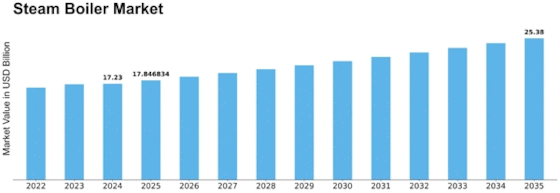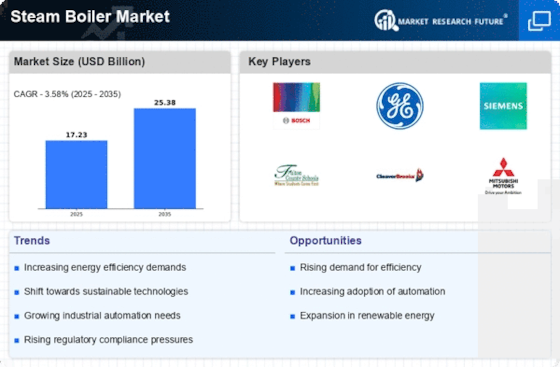Steam Boiler Size
Steam Boiler Market Growth Projections and Opportunities
The steam boiler market is influenced by a variety of factors that shape its dynamics and growth trajectory. These market factors encompass both internal and external elements, ranging from technological advancements to economic conditions and regulatory policies. Understanding these factors is crucial for stakeholders, including manufacturers, suppliers, and consumers, to navigate the market effectively.
Technological advancements play a pivotal role in shaping the steam boiler market. Innovations in boiler design, materials, and control systems enhance efficiency, reliability, and safety. For instance, the adoption of advanced control algorithms and sensors enables better monitoring and optimization of boiler operations, leading to improved performance and energy savings. Additionally, the integration of digitalization and IoT (Internet of Things) technologies facilitates remote monitoring and predictive maintenance, reducing downtime and operational costs for end-users.
Market demand is heavily influenced by economic factors such as industrial growth, infrastructure development, and energy prices. Industries such as power generation, oil and gas, chemical processing, and food processing drive the demand for steam boilers to meet their heating and process requirements. Economic downturns or fluctuations in energy prices can impact investment decisions and project timelines, affecting the demand for new boiler installations or retrofitting existing systems.
Environmental regulations and sustainability initiatives also shape the steam boiler market. Stringent emission standards and carbon reduction targets drive the adoption of cleaner and more efficient boiler technologies, such as low NOx (nitrogen oxides) burners, flue gas recirculation, and biomass co-firing. Additionally, incentives and subsidies for renewable energy and energy efficiency projects influence investment decisions and market dynamics, promoting the adoption of eco-friendly boiler solutions.
Globalization and trade policies have a significant impact on the steam boiler market, particularly in terms of supply chain dynamics and competitive landscape. Trade agreements, tariffs, and import/export regulations can affect the cost of raw materials, components, and finished goods, influencing pricing strategies and market competitiveness. Moreover, geopolitical factors and regional market trends shape demand patterns and market expansion strategies for industry players operating on a global scale.
Market competition and industry consolidation also influence the steam boiler market. Intense competition among manufacturers and suppliers drives innovation, product differentiation, and cost optimization. Mergers, acquisitions, and strategic partnerships reshape the competitive landscape, leading to market consolidation and the emergence of dominant players with broader product portfolios and global reach. This consolidation trend can impact market dynamics, including pricing, distribution channels, and customer relationships.
Consumer preferences and industry trends play a crucial role in shaping product development and market strategies in the steam boiler market. Increasing emphasis on energy efficiency, reliability, and sustainability drives the demand for high-performance and eco-friendly boiler solutions. Moreover, evolving industry trends such as decentralized energy systems, cogeneration, and district heating influence the adoption of steam boilers in various applications and end-user sectors.
The steam boiler market is influenced by a complex interplay of market factors, including technological advancements, economic conditions, regulatory policies, globalization, competition, consumer preferences, and industry trends. Understanding these factors and their implications is essential for stakeholders to anticipate market trends, identify growth opportunities, and make informed decisions in a dynamic and competitive market landscape.




















Leave a Comment